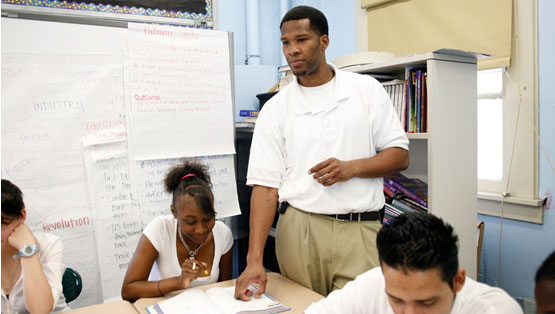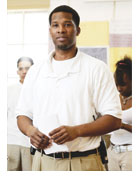Fellows Program Prepares Future Principals
| U.S. Education and Workforce Development | |

When it comes to career goals, Elton Thompson’s is simple: he wants to run his own school.
Thompson is an assistant principal at the Bronx High School for Law and Community Service in New York City. He took a major step toward making his aspirations a reality by completing the AED Leadership Fellows Program, a selective, 12-month program that trains assistant principals to become middle school principals—the undisputed administrative leaders at any school.
 CLASS IN SESSION: Elton Thompson visits a classroom that is staging a mock trial at the Bronx high school for Law and Community service, where he works as an assistant principal. Thompson took part in an AED program that prepares assistant principals to become principals, a career move that he hopes to make one day. he and other participants studied many aspects of strong school leadership, including how to create academically challenging classrooms and how to engage parents and members of the community in supporting their schools. Launch slideshow
CLASS IN SESSION: Elton Thompson visits a classroom that is staging a mock trial at the Bronx high school for Law and Community service, where he works as an assistant principal. Thompson took part in an AED program that prepares assistant principals to become principals, a career move that he hopes to make one day. he and other participants studied many aspects of strong school leadership, including how to create academically challenging classrooms and how to engage parents and members of the community in supporting their schools. Launch slideshow The fellows program, which is completing its first year, is an effort funded through a four-year, U.S. Department of Education grant to cultivate effective school leaders in low-income communities, specifically in the Bronx. A second part of the project helps middle grades principals deepen their expertise with the goal of lengthening their tenure.
Through the fellows program, administrators like Thompson, 34, are preparing for the specialized instructional and managerial challenges they will face when they move into the principal’s chair. These include nurturing leadership skills in other school employees, helping teachers improve their instruction, and urging all members of a school community—students and parents included—to take an interest in improving the school.
“Before, I had a very myopic perspective on the role of the principal,” Thompson explained. “Through the program, I’m more aware of the challenges principals face on a day-to-day basis. It’s more global.”
A Focused Set of Skills
One of the program’s goals is to provide assistant principals with a more focused set of skills than they are likely to have picked up through traditional in-service training and other professional development, said Carmen Jimenez, a co-facilitator on the project. A widespread misconception is that assistant principals and principals have interchangeable academic and administrative duties, when in fact their responsibilities are very different, explained Jimenez, herself a former principal in the Bronx.
Assistant principals typically aren’t exposed to the “whole picture” of academic and administrative duties, she said. “It’s a very different thing when you actually own all of these tasks.”
About 30 assistant principals applied to participate in the fellows program its first year; 11, including Thompson, were accepted. Applicants are chosen according to many factors, one of which is that they’ve shown they already have a solid grounding in strategies for promoting high-quality instruction.
At weekend retreats and after-school sessions, Thompson and his peers followed a program that is aligned with the leadership competencies identified by the New York City Public Schools. They
U.S. Southwest
KATRINA MONTAÑO–WHITE is the grantee program support specialist at the Migrant and Seasonal Head Start Technical Assistance Office.
I’m a member of a team that provides site training and technical assistance to migrant and seasonal Head Start programs across the United States. Although I live in Rio Rancho, New Mexico, I cover a nine-state area in the Southwest. One week I’ll be in Lubbock—in the Texas Panhandle—providing information on nutrition. The following week, I’ll be in Arkansas, providing training to curriculum specialists. Then I may head to Louisiana to do classroom observation and give feedback to teachers. Some of these programs are year-round, some are short term. I have to be flexible to meet their schedules. I suppose you could say I have different harvest seasons, just like the people we serve.
I’m not only working to help teachers, but I’m also working to help children and their families. The one thing I love about my job is the relationships I’ve formed. Without these relationships, I couldn’t open doors. But because of those bonds, I go into the centers, hug parents and children, and say to myself, “This is what I’m meant to be doing.” That’s where the heart and soul of our work is … in the centers, not in the office.
learned about issues such as adolescent development and creating academically challenging classrooms for students of different ability levels. They also studied research on effective school leadership, and received one-on-one support from mentor principals.
“My professional development before was a little abstract,” Thompson recalled. “This definitely made a strong connection to my day-to-day job.”
Understanding the Best Practices
Many of the students in the Bronx schools served by the fellows program are from poor households, and many of the borough’s schools have been labeled as in need of improvement under the federal No Child Left Behind Act. With those conditions in mind, Thompson and his peers have studied how family poverty and working conditions can make their work as school leaders more challenging, and how to overcome those barriers.
Nationwide, all school administrators are under pressure to improve student performance under the No Child Left Behind Act, particularly in reading and math. Earlier this year, the Obama administration released its blueprint for revising the law, which calls for new ways of identifying and developing effective teachers and principals. Sound leadership is especially important in middle schools, where test scores show that students tend to stagnate academically, noted Calvin Hastings, a senior director of AED’s Middle Start Program, which oversees the leadership fellows effort. The middle grades are widely regarded as a difficult period for students, emotionally and developmentally. AED’s goal is to nurture school leaders who have the skills and knowledge to embrace that challenge, he said.
“That doesn’t just happen without [principals] having a very strong understanding of the best practices around middle grades,” Hastings said. “It requires a specific set of expertise.”
Thompson, who completed the fellows program in January, can see himself putting that expertise to work. He wants to work in New York City, preferably in a school serving both middle and high school students. He plans to foster an environment in which students can grow, academically and holistically, and acquire the critical skills to succeed in life and live in a socially responsible way.
Yet he knows that a principal’s success also hinges on the ability to cope with the unpredictable.
As principal, “everything falls in your lap,” Thompson said. “The assistant principals are reporting to you, and they have responsibilities and accountability … But ultimately, it’s your name that’s attached to the school. I definitely feel prepared for that challenge.”
For more information, contact Calvin Hastings.
The Leadership Fellows Program is in the AED U.S. Education and Workforce Development Group, which works in seven core content and service areas: early childhood, disabilities, middle grades, high school and youth engagement, college access and postsecondary success, workforce development, and research and evaluation. The group leads educational change efforts that address a wide range of transitional goals, including school–to–career and healthy, lifelong learning.


